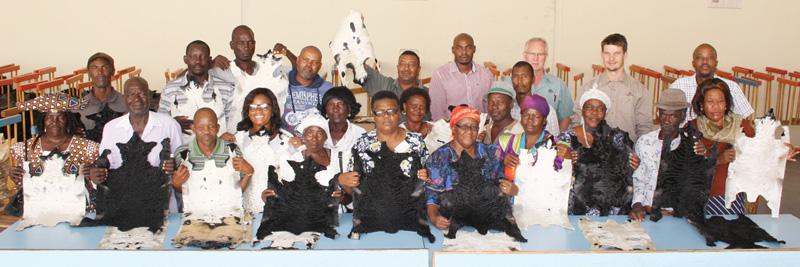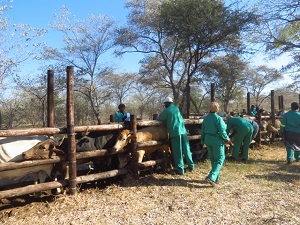
New laboratory tests for GMO

Lydia Horn from the Directorate of Agricultural Research and Training explaining to Hon. John Mutorwa, Minister of Agriculture, Water and Forestry, how marula jam is made at the Value Addition and Product development lab section during a tour of the Agricultural Lab. (Photograph by Hilma Hashange)
The laboratory was upgraded to the tune of N$10 million and boasts the latest technological equipment used in the testing for GMOs. The competency of the laboratory covers four areas – Nutrition, Soil, Biotechnology, and Value adding and product development.
The Nutrition lab specializes in animal nutrition, the Soil lab supports plant nutrition analysis, the Biotechnology lab protects crop biodiversity through the detection of GMOs, and the Value adding lab tests new methods and products for local production.
The decision to develop the GMO testing facility was taken in 2008 when a team of food scientists lead by Lydia Horn from the Ministry’s Directorate of Agricultural Research and Training wanted to establish the local capacity for detecting GMOs in seeds, crops and imported cereals. In 2009, procurement of equipment was finalized and Professor Chris Viljoen from the GMO testing facility at the University of the Free State trained the scientists and set up the facilities at the lab.
Earlier this year, findings done by the Namibia Consumer Trust revealed that three popular maize products contained evidence of genetically modified maize.
The consumer protection lobby group sent samples of maize for testing in South Africa and found that Ace Instant porridge contained 56.82 % genetically modified maize, White Star Maize Meal contained 2.75% genetically modified maize and Top Score contained 1.09% genetically modified maize.
Prof. Viljoen, whose areas of expertise include the detection of GMOs, labeling of genetically modified food and human molecular biology says that a GMO testing facility is important for traceability to assure purity and segregation of products as well as to comply with international import legislation. “Setting up a facility such as this one at the ministry requires specialised expertise, equipment and methods, which I am happy to note this facility has acquired,” Viljoen said. He added that the facility will serve the nation by providing a wide application of genetic screening and offer a platform for other forms of genetic testing. The facility can test both unprocessed and processed food.
Hon. John Mutorwa, Minister of Agriculture, Water and Forestry, who officially opened the laboratory, stressed the importance of product labeling saying that consumers have the right to know what they are consuming. “Therefore, proper, ethical, honest and professional labeling of these products would give consumers choices, whether to take GMO food or not,” Mutorwa emphasised. He said the laboratory is ready to test whatever will be presented to it as well as all the planting materials used at the Green Scheme Irrigation Projects.











































